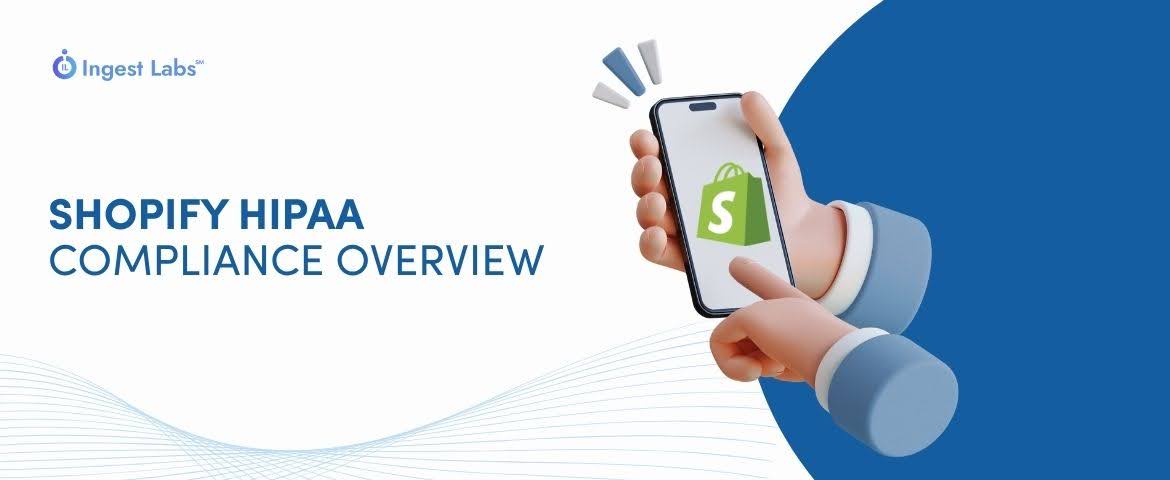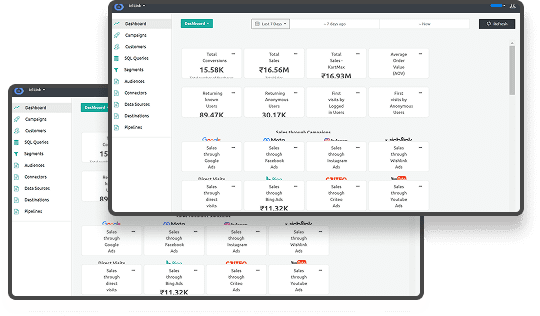Understanding Shopify HIPAA Compliance for E-commerce
Is Your E-Commerce Platform Ready for HIPAA Compliance?
The U.S. healthcare e-commerce market is experiencing significant growth. It is projected to reach approximately $1.44 trillion by 2032, up from $327.8 billion in 2022, driven by increased consumer spending on medical products and internet penetration. This surge underscores the importance of e-commerce businesses in ensuring compliance with the Health Insurance Portability and Accountability Act (HIPAA) when handling protected health information (PHI).
While popular for online retail, platforms like Shopify are not inherently HIPAA compliant. Shopify does not sign Business Associate Agreements (BAAs), a requirement for any service provider that stores, processes, or transmits protected health information (PHI) on behalf of a covered entity. Without a BAA, using Shopify to manage PHI directly would violate HIPAA regulations. However, businesses can still utilize Shopify in a HIPAA-conscious manner by implementing strategic configurations:
This blog explores the complexities of achieving HIPAA compliance on Shopify, providing insights into key considerations, third-party integrations, and best practices to protect sensitive health information.
What Is HIPAA?
The Health Insurance Portability and Accountability Act (HIPAA) is a federal law that sets national standards for protecting sensitive patient health information. Compliance with HIPAA is mandatory for e-commerce businesses that collect or handle protected health information (PHI), including prescription data, medical histories, or any other health-related identifiers. It is a legal obligation.
Noncompliance with HIPAA can result in severe financial and legal consequences. The U.S. Department of Health and Human Services’ Office for Civil Rights (OCR) has resolved over 31,000 cases, resulting in systemic improvements for all affected individuals. OCR has imposed civil penalties in 152 cases totaling over $144 million. Investigations have involved various entities, including national pharmacy chains and small providers..
Beyond penalties, data breaches involving PHI can severely damage customer trust and harm a business's reputation, which are risks that e-commerce stores must address when operating in healthcare-adjacent spaces.
If you’re using Shopify for your online business, it’s natural to wonder how it fits into this compliance landscape. Let’s take a closer look at how Shopify measures up against HIPAA requirements.
Is Shopify HIPAA Compliant?
By default, Shopify is not HIPAA compliant. The platform does not enter into Business Associate Agreements (BAAs), a requirement for any service provider that stores, processes, or transmits protected health information (PHI) on behalf of a covered entity. Without a BAA, using Shopify to manage PHI directly would violate HIPAA regulations.
That said, Shopify can still be part of a HIPAA-conscious workflow. While the platform doesn’t offer native HIPAA compliance, businesses can configure their Shopify store to operate in a HIPAA-aligned manner by keeping PHI out of the platform and routing sensitive information through secure, compliant third-party tools. This approach requires careful planning and technical oversight, but it allows healthcare-adjacent e-commerce businesses to utilize Shopify while maintaining compliance.
Your store setup must be intentional to make this work. The following section discusses the core areas you must address when adapting Shopify to meet HIPAA expectations.
Read: Enhancing Privacy and Conversions: A Closer Look at Ingest Labs Advancements
Key Considerations for HIPAA Compliance on Shopify
Using Shopify in a HIPAA-conscious manner requires strategic configuration and supporting infrastructure. Since Shopify does not offer HIPAA compliance, businesses must ensure that all PHI is handled securely outside Shopify’s native systems. Below are the core considerations you need to account for when aligning your Shopify setup with HIPAA requirements:
1. Data Segregation
Manage protected health information (PHI) through secure, HIPAA-compliant third-party systems to keep it out of Shopify's environment.
- Use external platforms or plugins designed explicitly for PHI handling.
- Route sensitive data, such as medical forms or prescription details, to separate databases hosted on a HIPAA-compliant infrastructure.
- Avoid capturing PHI through Shopify’s built-in forms or checkout flow.
2. Secure Hosting for PHI
Host any PHI on cloud services that provide signed Business Associate Agreements (BAAs).
- Amazon Web Services (AWS) and Microsoft Azure offer HIPAA-compliant hosting environments.
- Configure Virtual Private Clouds (VPCs) with access logs, firewall rules, and dedicated subnets for added security.
- Ensure your hosting vendor supports encryption at rest and regular backups with access monitoring.
3. Encrypted Data Transmission
All data, including non-sensitive information, should be encrypted in transit.
- Use SSL/TLS certificates to secure your Shopify storefront and connected systems.
- Apply HTTPS across all pages, particularly those involving user data input or transactions.
- Encrypt API communications between Shopify and third-party apps using secure protocols (e.g., OAuth 2.0, HMAC).
4. Access Controls and Authentication
Limit access to sensitive systems and protected health information (PHI) based on individual roles and responsibilities.
- Enforce multi-factor authentication (MFA) for all administrative access points.
- Set up user roles with the principle of least privilege (POLP), ensuring staff can only access the data they need.
- Keep access logs and review them regularly for any suspicious activity.
5. Regular Security Audits and Monitoring
Rigorously identify risks and ensure ongoing compliance through periodic reviews.
- Schedule third-party penetration testing and vulnerability scans to uncover potential weaknesses.
- Utilize log monitoring and alert systems to identify and flag unauthorized access attempts.
- Maintain documentation of all audits and remediation efforts for compliance verification purposes.
By implementing these safeguards, you’re not making Shopify HIPAA compliant, but building a compliant architecture around it. This structure minimizes risk while allowing you to keep Shopify as a user-facing commerce platform.
But to make this architecture practical and seamless, integrating reliable third-party tools is your next move. Let’s talk about how to do that.
Integrating Third-Party Solutions for Compliance
Since Shopify does not inherently support HIPAA compliance, integrating third-party services becomes crucial for e-commerce businesses that handle protected health information (PHI). These tools bridge the compliance gap by managing sensitive data outside Shopify’s core infrastructure, without disrupting the shopping experience.
Here’s how to approach integration effectively:
1. Use of Specialized Applications to Handle PHI Securely
- Ingest Labs’ Ingest IQ can complement this setup by managing customer consent across devices, ensuring PHI is handled with privacy-first logic and tracked only where legally allowed.
- These platforms ensure that data never touches Shopify’s backend and that all activity is covered under a Business Associate Agreement (BAA).
2. Embedding Secure, Compliant Forms on Shopify
- Embed HIPAA-compliant forms directly into your storefront using iframe or script integrations.
- These forms manage the intake and encryption of data in transit and at rest, ensuring adherence to strict HIPAA protocols.
- Styling options enable the forms to integrate visually with your website, maintaining branding consistency while ensuring compliance.
3. Maintaining Brand Consistency Through Customization
- Most secure form builders fully control layout, fonts, and input elements.
- Mobile responsiveness and multilingual support are also key when customizing forms.
- Meanwhile, Ingest IQ ensures that all event tracking and data tagging, done post-submission, remains HIPAA-appropriate by routing signals through a secure, server-side architecture.
4. Improving Attribution with Privacy-First Analytics:
- Ingest ID can be used to assign a first-party identifier to each visitor, helping you understand their journey without storing PHI in Shopify.
- This ensures that marketing personalization remains accurate while upholding strict data governance practices.
Utilizing third-party tools in conjunction with privacy-first data intelligence solutions provides a flexible and compliant architecture, enabling you to meet healthcare-related needs without incurring regulatory violations. Next, consider what to do if something goes wrong: build a breach response plan.
Building a Breach Response Plan
Even with strong safeguards, no system is entirely immune to breaches. HIPAA mandates that any e-commerce entity handling PHI have a well-documented and tested breach response plan. This is not just about compliance, it’s about protecting your customers and reputation.
Key elements of a strong breach response strategy include:
- Clear, Actionable Steps in the Event of a Breach:
- Detect, contain, and assess the scope of the breach immediately.
- Notify affected individuals promptly as HIPAA requires notification within 60 days of discovery.
- Report breaches involving 500+ individuals to the U.S. Department of Health and Human Services (HHS), and in some cases, to the media.
- Routine Testing and Regular Updates:
- Review your plan quarterly or after any significant platform change.
- Conduct internal simulations and penetration testing to validate readiness.
- Tools like Ingest IQ support incident detection by providing real-time visibility into data movement and identifying anomalies, enabling faster breach detection.
- Defined Roles and Staff Readiness:
- Designate a HIPAA Privacy Officer or Compliance Lead.
- Train employees to understand their responsibilities in the event of a data breach.
- Maintain accessible documentation that outlines reporting hierarchies, external contacts, and legal obligations.
- Auditable Data Practices with Smart Monitoring:
- Utilizing Event IQ’s centralized intelligence dashboard can help track and record customer interactions across platforms, offering historical data trails that may aid in identifying the source and scale of a breach.
- This transparency also facilitates compliance audits following an incident.
With tools like those from Ingest Labs, your Shopify operation can do more than react to data breaches; it can minimize exposure, detect anomalies faster, and confidently maintain HIPAA compliance.
Final Thoughts
Navigating HIPAA compliance on Shopify may seem complex, but it's achievable with the right strategy and tools. From securing third-party integrations and managing PHI outside Shopify’s infrastructure to creating a robust breach response plan, every step matters in protecting sensitive health data and building customer trust. Compliance isn’t just about avoiding penalties—it’s about maintaining credibility in a privacy-conscious market.
Ingest Labs simplifies the process by offering privacy-centric solutions that seamlessly integrate into e-commerce environments. Whether you require precise server-side tracking, insights on customers based on their consent, or effective data governance, our products—Ingest IQ, Ingest ID, and Event IQ—deliver the flexibility and compliance assurance your Shopify store needs, particularly if it handles HIPAA-sensitive data.
Ready to build a HIPAA-compliant Shopify store with confidence? Talk to Ingest Labs today and take the first step toward secure, scalable, and compliant e-commerce.






